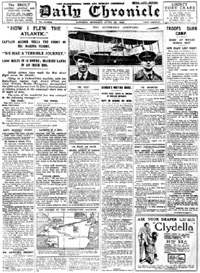 The Daily Chronicle (London, UK)
The Daily Chronicle (London, UK)
- The Brute: Tale of a Bloodthirsty Brig (Dec 5, 1906)
- Well Done! (Aug 22, 1918 — Aug 24, 1918)

18 June 1919
The Daily Chronicle began life in 1872 as the successor to The Clerkenwell News, a London local weekly. Aligned with the Liberal Party, it grew in stature under the editorship of H.W. Massingham (1895-1899), W.J. Fletcher (1899-1904), and Robert Donald (1904-1918), the latter also editor of the mass-circulation Lloyd's Weekly News. Distinguished journalists and artists who worked on it during the early twentieth century included Hamilton Fyfe, Phil May, F.H. Townsend, Frank Brangwyn, and Philip Gibbs and Arthur Conan Doyle, who both sent dispatches from the Western Front. Under pressure from The Daily Mail, the paper cut its price to halfpence in 1914, a measure that Donald claimed had raised its circulation to 400,000 -- more than The Times, The Morning Post, The Evening Standard, and The Daily Graphic combined. After merging with The Daily News in 1930 to become The News Chronicle, it was finally absorbed by The Daily Mail in 1960.
At the outbreak of the First World War, David Lloyd George, then Chancellor of the Exchequer in the Liberal government of Herbert Asquith, persuaded Donald to lend The Daily Chronicle's support to the war effort. Donald went on to publish articles that helped Lloyd George to supplant Asquith as Prime Minister in December 1916. He also advised Lloyd George on the formation of a War Propaganda Bureau, becoming his Director of Propaganda in Neutral Countries in February 1918. In May that year, however, Donald unexpectedly hired as The Daily Chronicle's military correspondent Frederick Maurice, a general who had been forced to retire after revealing that Lloyd George had mislead parliament about troop numbers. Keen to acquire an influential paper upon which he could rely for support, Lloyd George, who had gained control of the Daily News during the Boer War, responded by forming a consortium to buy The Daily Chronicle. On 4 October 1918, the consortium, led by James Dalziel, purchased the paper from United Newspapers Limited for '1,650,000, money later found to have been raised by Lloyd George's covert selling of honours. Donald resigned his positions at The Daily Chronicle and Lord Beaverbrook's Ministry of Information in protest, to be succeeded as editor by Ernest A. Perris. In 1926, Lloyd George sold The Daily Chronicle at a large profit to two businessmen, David Yule and Thomas Catto.
Despite his antipathy to its politics, Conrad read The Daily Chronicle regularly and knew some of its staff. He had been in contact with Gibbs when part of The Mirror of the Sea appeared in The Tribune, and he read reports by his friend Perceval Gibbon on the Battle of Caporetto (CL 6:146). The Daily Chronicle was also one of the newspapers whose literary opinions Conrad valued, and he wrote to its reviewers on two occasions: in 1895, to thank Henry Norman, assistant editor of The Daily Chronicle and founder of The World's Work, for his favourable review of Almayer's Folly (PL 17); and in 1907, to thank his old friend W. H. Chesson for 'the pleasure your review [of The Secret Agent] has given me' (CL: 3:476). Inviting William Harold Maas, who worked in the paper's literary dept, to pay a visit to Capel House in 1911, he asked: 'Could you procure for me the No of the Chronicle containing the review of my novel [Under Western Eyes]?' (CL 4:498).
In August 1918, Conrad received '20 for his three contributions to a newspaper whose daily circulation now exceeded 800,000. The following month, he was approached by The Daily Chronicle about submitting another essay. Responding to Conrad's wish that 'the D[aily] C[hronicle] [might] gave me some hint of a subject or two' (CL 6:262), it proposed the Bolshevik Revolution as a topic; Conrad eventually declined the offer on the grounds of ill-health.
Sources
Conrad, Joseph. Notes on Life and Letters. Ed. J.H. Stape, assisted by Andrew Busza. Cambridge: Cambridge University Press, 2004.
Davies, Laurence, et al., ed. The Collected Letters of Joseph Conrad. Cambridge: Cambridge University Press, 1983-2007. 9 vols.
McEwen, J.M. 'Lloyd George's Acquisition of the Daily Chronicle in 1918'. The Journal of British Studies 22/1 (Autumn 1982): 127-144 . Available to subscribing institutions and individuals via JSTOR.
Sherry, Norman. Conrad: The Critical Heritage. 1973. Cambridge: Cambridge University Press, 1996.
Stape, J. H., and Owen Knowles. A Portrait in Letters: Correspondence to and about Conrad . Amsterdam: Rodopi, 1996.
Williams, Francis. Dangerous Estate: The Anatomy of Newspapers. 1957. Cambridge: Patrick Stephens, 1984.